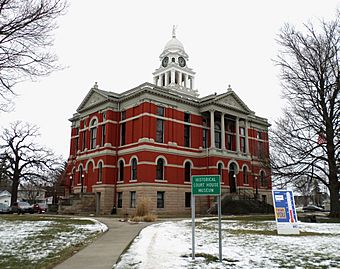Courthouse Square Museum facts for kids
Quick facts for kids |
|
|
Eaton County Courthouse
|
|
|
U.S. Historic district
Contributing property |
|
 |
|
| Location | W. Lawrence Ave. at Cochran and Bostwick Sts., Charlotte, Michigan |
|---|---|
| Area | less than one acre |
| Built | 1883 |
| Built by | Gibbs & Co. |
| Architect | Miles, Cramer & Horn |
| Part of | Charlotte Central Historic District (ID100002684) |
| NRHP reference No. | 71000389 |
| Added to NRHP | April 2, 1971 |
The Courthouse Square Museum is a cool old building in Charlotte, Michigan. It used to be a government building, but now it's a museum where you can learn about history! This special building was added to the National Register of Historic Places in 1971, which means it's an important historical site. You can find it at 100 West Lawrence Avenue.
Contents
History of the Courthouse
Building a New Home for Eaton County
Eaton County was officially formed in 1837. At first, the main county offices were in Bellevue, Michigan. But in 1840, the county seat, which is like the main office location, moved to Charlotte.
For a few years, county business happened in a hotel. Then, in 1845, the first proper courthouse was built. It was a small wooden building.
Growing Needs and a Grand New Building
By 1880, Eaton County was growing fast. The old courthouse was too small for all the county's needs. So, in 1882, leaders decided to build a brand new, much bigger courthouse.
They hired architects named Miles, Cramer & Horn from Toledo, Ohio, to design the building. Contractors from Toledo also helped build it. The first stone was laid in 1883, and the whole building was finished in 1885.
From Courthouse to Museum
In 1895, a fire damaged much of the inside of the building. But don't worry, the inside was rebuilt! The building continued to serve as the county government's home until 1976. That's when a new county complex was built about a mile north of downtown Charlotte.
In the 1980s, people started working to restore the old courthouse. Then, in 1993, a group called the Courthouse Square Association took over. They now take care of the building and the land around it. Today, the top two floors of the 1885 Courthouse are a public museum. You can also rent out spaces there for events. The ground floor has offices and shops.
What the Courthouse Looks Like
The old Eaton County Courthouse is a three-story building with a sloped roof. The first floor is made of rough fieldstone, which is a type of natural rock. The upper floors are made of red brick with stone decorations.
Special Features of the Building
- Entrances: You walk up stairs to reach the entrances on the second level.
- Windows: Windows and doorways on the second floor have round tops. The windows on the third floor are square, except for the ones in the middle section of each side.
- Projections: On the third level, parts of the building stick out. These parts have triangular shapes above them, called pediments, and fancy carvings.
- Cupola: In the middle of the roof, there's a tall, three-part tower called a cupola. It has a square base, an open section with columns, and an eight-sided dome on top.
- Statue: A statue of justice stands proudly on top of the dome.
 | Lonnie Johnson |
 | Granville Woods |
 | Lewis Howard Latimer |
 | James West |



